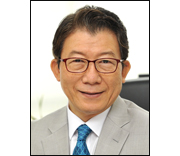-
[January 10, 2017 Korea times] Caring attitude saves the economy
- Date : 2017.01.12
- Views : 459
Caring attitude saves the economy

By Jeffrey I. Kim
I have watched the movie “Gandhi” with deep emotion. The film was released around the end of year 1982. It was nominated for Academy Awards in eleven categories, winning eight, including Best Picture. Ben Kingsley played the title role and won for Best Actor. The film dramatized the life of Mahatma Gandhi (1869-1948), the leader of India’s non-violent independence movement against the UK rule during the 20th century. Gandhi led India to independence and inspired movements for civil rights and freedom across the world.
In the movie there were numerous scenes that touched me deep in my heart. Among them was one scene I still remember. One of Gandhi’s men was killed by political enemies and his staff tried to avenge his death. But Gandhi stopped him by saying something like this, “If everyone revenges ‘an eye for an eye’, the whole world will be half blinded.” Gandhi’s men were unhappy not to avenge the death of their friend. Finally, however, their perseverance and non-violent and non-cooperative strategy worked and made India independent. He is called the Father of the Nation.
These days many Koreans are suffering from despair and anxiety. Several years of low growth and high unemployment have driven ordinary people to anger. Young people in particular feel the wrath and sorrow because of increasing competition for quality jobs. They often engage in brutal cut-throat competition amid the decreasing chances of getting married. Married people believe that they cannot afford to raise more than one child due to rising education expenses.
They get angry at political leaders, high-ranking officials, and business tycoons. Along this line they bitterly criticize the lack of presidential leadership. Candlelit rallies have been taking place throughout Korea every Saturday evening for the past two months. In particular the central plaza in front of Gwanghwamun near the Presidential residence has been fully packed with demonstrators. Some Saturdays the people rallied calling for Park to voluntarily resign. Other Saturdays they rallied urging the Constitutional Court to dismiss her impeachment. These rallies will continue for a while regardless of whether or not the Constitutional Court will dismiss Park from office. Unfortunately at the moment, national opinion is split in two. This itself poses as a serious matter in the eyes of foreign investors.
At this point, Korea is in a precarious position politically and economically. The fate of the nation is like a candle flickering in the wind. There is a signal that the nation’s economy is shrinking with decreasing exports. The hatred ordinary people have for political and social leaders and for the government may be partially justified but not fully. It is because Korea has been under strong influence of North Korea’s provocative actions and the global economic setback.
Young people even question the superiority of capitalism over socialism. However, they must be misguided if they believe that capitalism is to protect the capitalists only. Capitalism is a social system based on the recognition of individual rights including property rights. Politically it is a system of freedom. Legally it is a system of rule of law as opposed to rule of man. Economically it refers to the free-market system.
In the early period of capitalism, financial capital and physical labor were cited as major factors of production. Later ‘human capital’ and ‘social capital’ were developed and used as more important productive inputs. The importance of human capital has made people invest in higher education. Social capital is a form of economic and cultural capital in which social networks are central. This concept developed during the 1990s to explain the improved performance of business management and the value derived from strategic alliances, and the evolution of communities. In today’s world, we cannot expect the active creation and utilization of our social capital. At any rate, the young people should not be obsessed by the wrong interpretation of capitalism.
The macroeconomic indicators show that the Korean economy is still doing alright. But Korea’s social capital is being rapidly eroded as the Korean people increase their hatred and mistrust against one another. We should change our attitude from hatred to forgiveness and from hurting people to caring about people. Then we can save our economy out of the low-growth trap.
http://www.koreatimes.co.kr/www/news/nation/2017/01/198_221667.html










